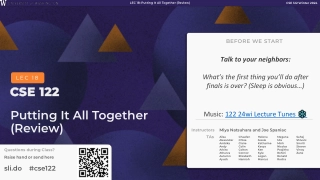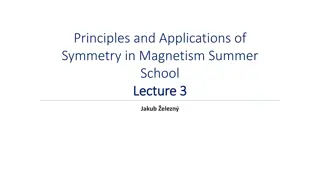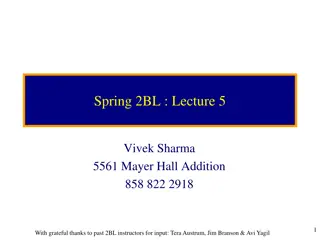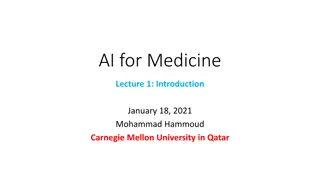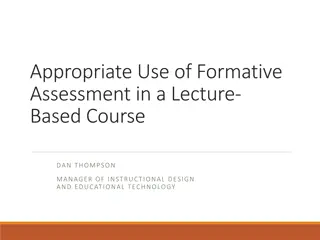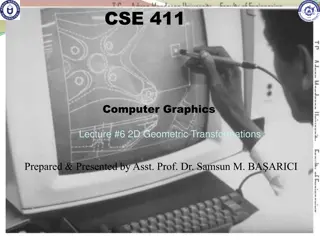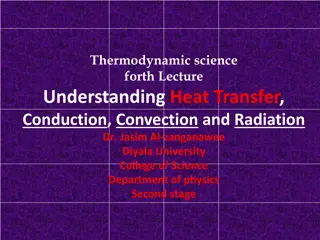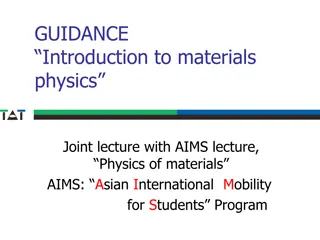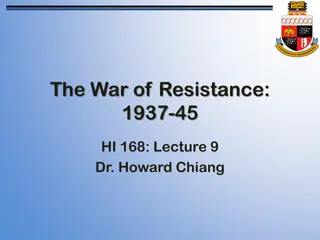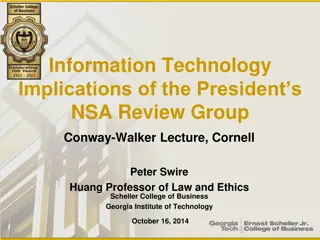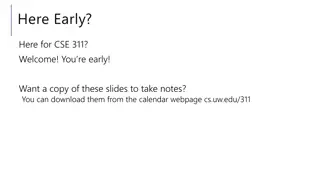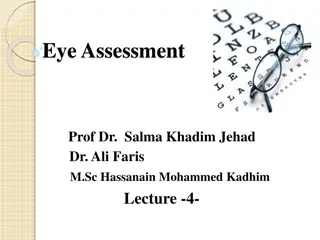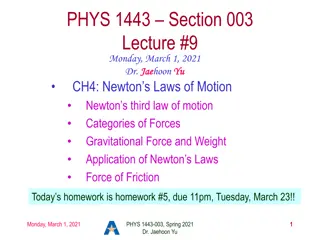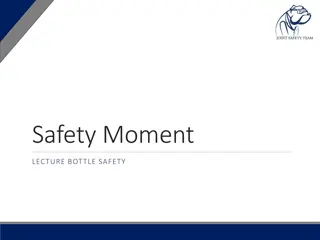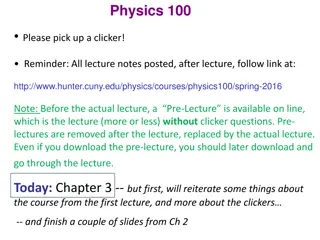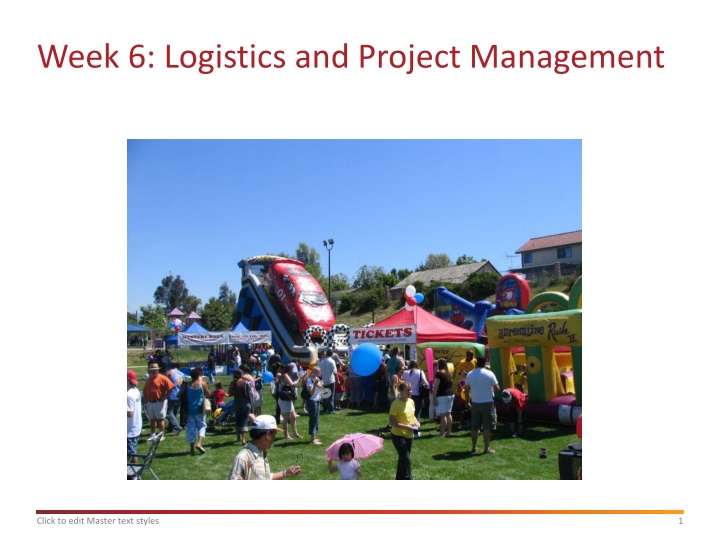
Event Logistics and Project Management Insights
Explore the vital role of logistics in event management, compare logistics and project management in event settings, delve into event design importance, and understand underlying event design principles. Discover how project management approaches break down events into manageable tasks, leading to systematic planning, coordination, and advantages such as clear communication and risk mitigation.
Download Presentation

Please find below an Image/Link to download the presentation.
The content on the website is provided AS IS for your information and personal use only. It may not be sold, licensed, or shared on other websites without obtaining consent from the author. If you encounter any issues during the download, it is possible that the publisher has removed the file from their server.
You are allowed to download the files provided on this website for personal or commercial use, subject to the condition that they are used lawfully. All files are the property of their respective owners.
The content on the website is provided AS IS for your information and personal use only. It may not be sold, licensed, or shared on other websites without obtaining consent from the author.
E N D
Presentation Transcript
Week 6: Logistics and Project Management Click to edit Master text styles 1
Lecture Objectives To examine the role of logistics in event management. To compare logistics to project management in an events setting. To explore the importance of event design in planning a community event. To understand the principles that underpin event design. Click to edit Master text styles 2
A Worst Case Scenario? Woodstock 1969 https://www.youtube.com/watch?v=StFhvAIv3Js&feature=related Click to edit Master text styles 3
Logistics Comes from a military setting. Logistics focuses on a process. The efficient bringing together of all the means of production to create a product or service. Traditionally the way that events are run. Seen as a process that should be carried out in the most efficient way possible. Click to edit Master text styles 4
Logistics Elements System Supply of Customers Supply of Product Supply of Facilities Event Site Logistics Event Shutdown What are the problems with this approach? Click to edit Master text styles 5
Project Management Approach Breaks down the event into smaller tasks that are run by separate teams. Production process over a limited or finite time not ongoing. Work of team is planned and coordinated. https://www.youtube.com/watch?v=9LSnINglkQA Click to edit Master text styles 6
Advantages of the Project Management Approach Systematic written down and recorded so that it can monitored and improved. Clear instructions, manuals and tasks mean that it is a team effort and easily communicated to those accountable. Up to date reports and assessment can be done along the way. Avoids the risk that the event s success relies on one person. Click to edit Master text styles 7
Phases of the Project Management of Events Initiation (feasibility, develop concepts and objectives) Planning Implementation Event Shut-down Click to edit Master text styles 8
Project Management Tools Critical Path Analysis Highlights the preferred or planned path for the creation of the event, but also shows other options. Click to edit Master text styles 9
Project Management Tools Gantt Charts Bar charts used as a visual representation of the schedule. Tasks Timing/time lines Priority of tasks what needs to be completed before this task can start? Milestones tasks of particular importance Click to edit Master text styles 10
http://www.eventmanager.blog.com Gantt Chart of Music Festival Click to edit Master text styles 11
The Event Organiser as Project Manager Coordinates all the tasks and teams. Event Organiser often deals with an Organising Committee. Have to manage upwards and downwards. Might be involved in multiple projects (events) at the one time. Click to edit Master text styles 12
Event Staging Staging originates from the theatre May refer to organisation of an event in a single location May refer to organisation of a venue within a larger event/festival It covers everything from theming and event design, to programming, and operational elements of the event, such as power, light and sound, audiovisuals, catering, working with contractors and contingencies. Click to edit Master text styles 13
Common Tasks: Programming The flow of performers, speakers, catering and other elements of the event Creates the event experience Can be very complex (Gantt Charts) Create a production schedule Click to edit Master text styles 14
The Production Schedule The production schedule is the main document for staging and the master document from which all other schedules and programs are created. Helps to keep the event on track, with a detailed listing of tasks. Includes the bump-in and bump-out . Click to edit Master text styles 15
Common Tasks: Event Design The design should be consistent with the concept. Both need to be developed with the event s core values in mind. Events should be developed with ceremony and ritualistic elements. This is event design. It brings colour and meaning into the event. Makes them authentic. Focus on management elements and not enough emphasis on the event design. Click to edit Master text styles 16
Common Tasks: Site Construction, Set Up and Shut Down Staging tends to be handled by professionals Briefing Highly experienced Click to edit Master text styles 17
Common Tasks: Working with Contractors Identify and source appropriate contractors to provide event services Provide accurate briefing or specification Confirm arrangements with contractors in writing Click to edit Master text styles 18
Common Tasks: Front of House/Ticketing Some events may be primarily funded through tickets. Ticketing may also be useful to manage queuing. Distribution i.e. use of agencies like Ticketmaster, Half-tix; mail; Internet; telephone. Ticket collection at gate Security collection and depositing of funds. Reconciliation of tickets with revenue. Flow of people through the gate Use of wrist bands or stamp on wrist. Picking up name tags/delegate bags Click to edit Master text styles 19
Common Tasks: Dealing with Audience and Guests Position of entrance and exits Arrival and departure times - dump or trickle? Facilities Click to edit Master text styles 20
Issues of Crowding at Festivals Event crowding might be perceived positively presence of other people might add to/enhance the experience of attending an event. Event zones using queuing and involving one-on-one consumption are more generally associated with negative crowding perceptions. White Night overcrowding? Click to edit Master text styles 21
Common Tasks: Performer Liaison and Coordination Can range from professionals to school groups Can be very high cost Staging requirements Click to edit Master text styles 22
Common Tasks: VIP Handling http://tbn3.google.com/images?q=tbn:FlYPXmuld0wE4M:http://lh6.ggpht.com/_iJGnP_y2tK0/Sjl3dxx97UI/AAAAAAAAARA/EzvREx2W1_4/VIP.jpg Meet people at airport, accommodation, transport to venue. Artist needs on-site backstage facilities, dressing rooms, sound and lights. Click to edit Master text styles 23
Celebrity Requests - Adele Adele asks for chicken salad sandwiches, Marlboro Lights, the 'best quality' red wine and 6 metal teaspoons in her dressing room. She also bans organic honey. The Demands: 12 Small bottles still (non-carbonated) spring water (at room temperature) 1 Electric kettle for BOILING water 6 Large mugs for tea. All mugs should be new, washed and dried. 6 metal teaspoons 2 'Squeezy' bottles clear honey (not organic) 1 Bottle very best quality red wine (Italian, French or Spanish) 1 Assortment of chewing gum 1 Pack Marlboro Light plus 1 disposable cigarette lighter 1 Small selection fresh fruit, to include bananas, apples, grapes, fresh berries NO CITRUS FRUIT! 1 Small plate of assorted freshly made, individually wrapped sandwiches, to include chicken salad. Sandwiches must NOT contain tomatoes, vinegar, chilli or citrus fruit Click to edit Master text styles 24
Common Tasks: Volunteer Management Recruitment Training Retention https://www.youtube.com/watch?v=9JUzwRMbH-o Click to edit Master text styles 25
Common Tasks: Power, Light, Sound and Waste Management Power requirements Lighting Sound can excite or calm the audience and create emotions. Waste management Click to edit Master text styles 26
Common Tasks: Audiovisuals and Special Effects Special effects are used to attract attention, generate excitement and sustain interest (Goldblatt, 2005). Depends on: Event theme Budget Skills of AV company Click to edit Master text styles 27
Common Tasks: Catering A catering contractor usually does the catering for an event. Different approaches to event catering The style of cooking and the type of service have the main impact on cost. Food safety is essential Timing is an important issue Click to edit Master text styles 28
Common Tasks: Security Use of contractors Location of security Importance of communication See case study V Festival Click to edit Master text styles 29
Case Study: V Festival, UK Public order and drug-related offences Festival organisers developed a close working relationship with local authorities/emergency services Letter campaign to deter known trouble-makers Occasional Licences police given powers to ban anyone committing or threatening acts of violence from attending any UK festival for 2 years. Random vehicle searches on entry look for drugs, offensive weapons. Undercover ventures to identify and target drug dealers. Click to edit Master text styles 30
Common Tasks: Risk Management Risk management can be defined as the process of anticipating, preventing, or minimising potential costs, losses, or problems for the event, organisation, partners, and guests. Risks occur naturally and cannot be ignored, and events are prone to particular types of risk. Click to edit Master text styles 31
Contingencies and the Contingency Plan What if... The power goes out? The performers don t arrive? There is an emergency? Importance of a contingency plan plan in place to deal with things which might go wrong. Covers things like the weather alternative venue? natural disaster, terrorist attack, VIP or acts cancel, emergency situations. Part of risk management and might prevent legal action i.e. negligence. Click to edit Master text styles 32

